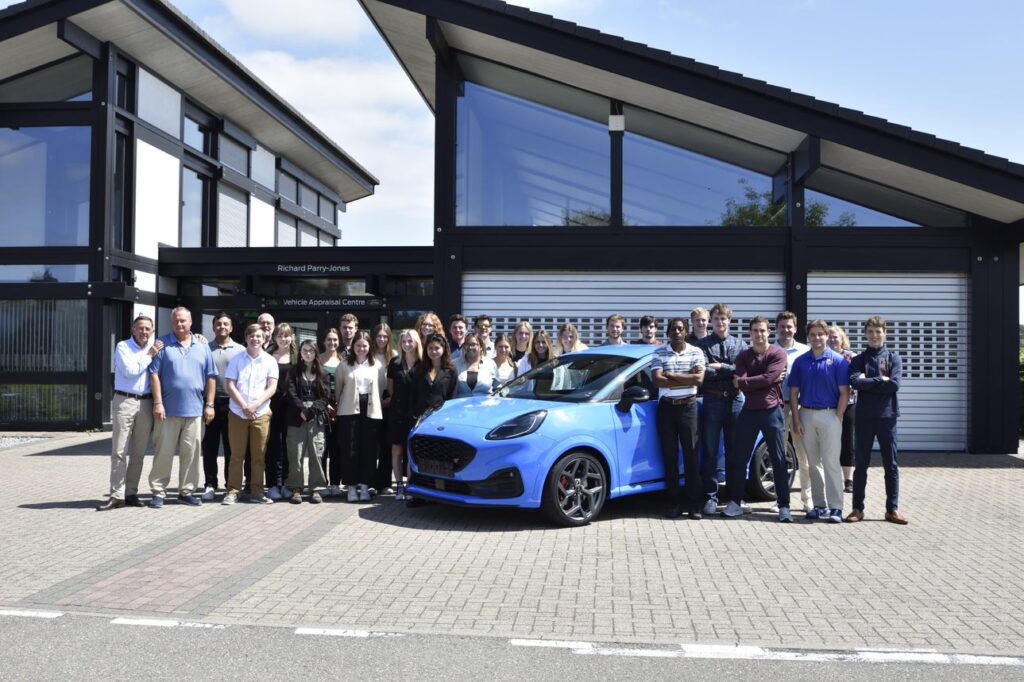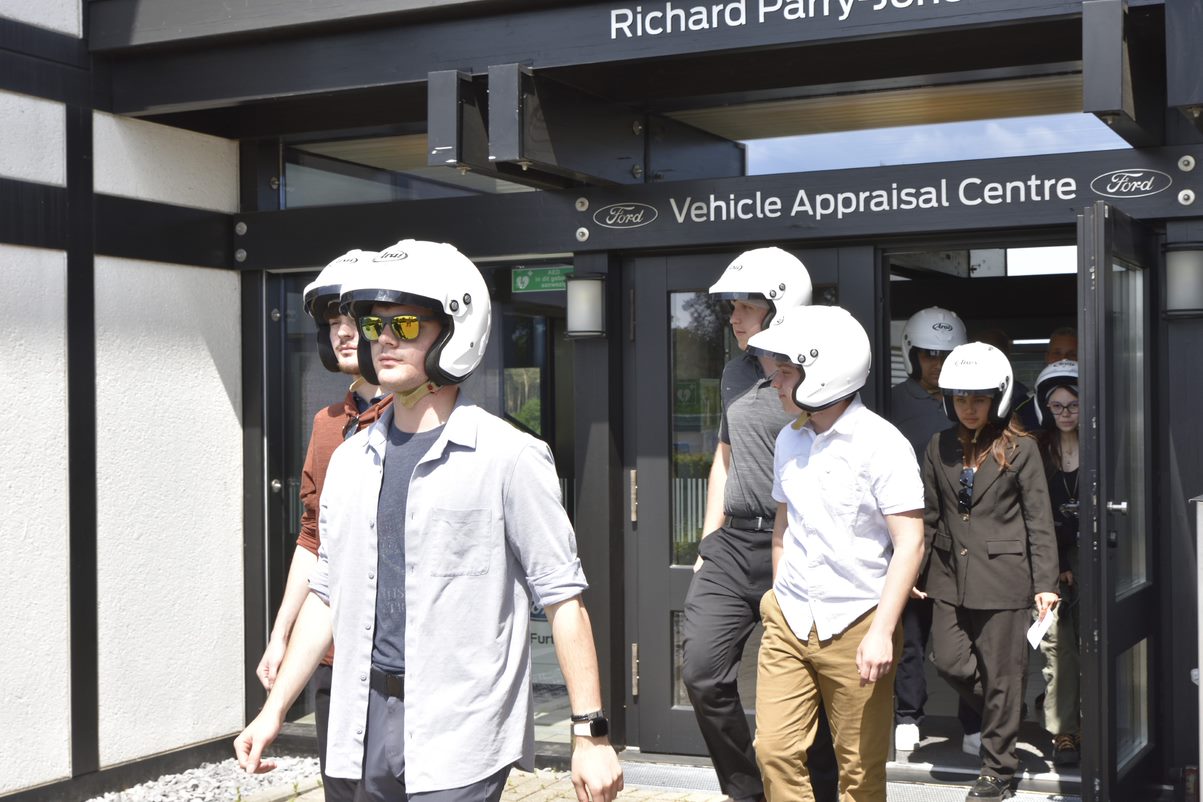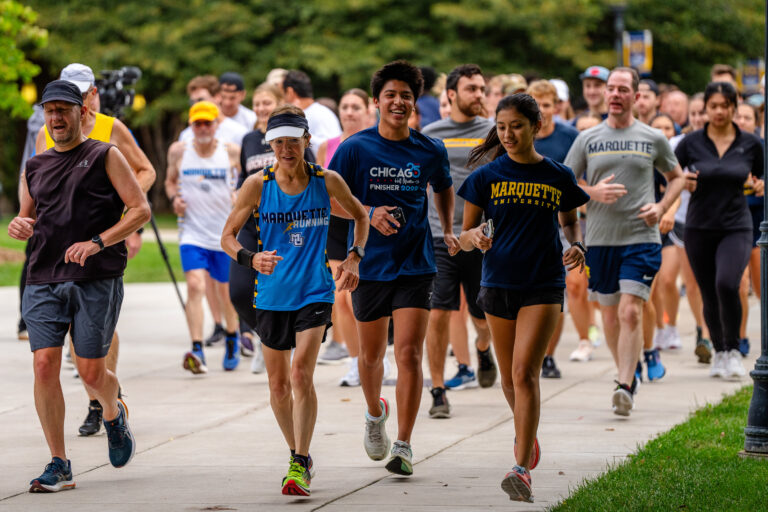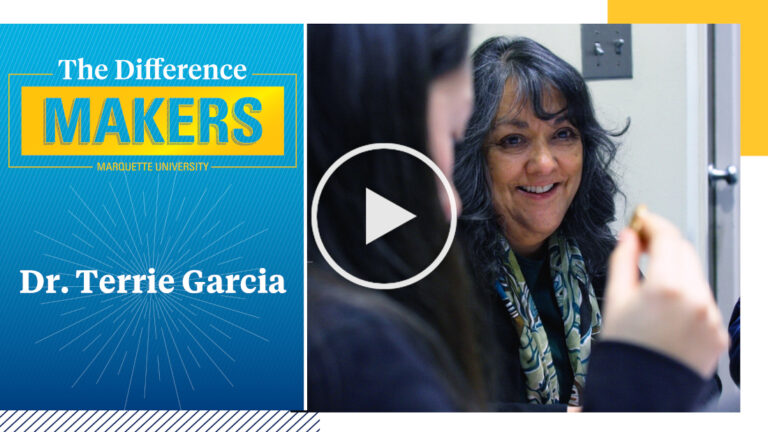The Ford Lommel Proving Ground is something very few outsiders get to see. Tucked away in the Belgian countryside, the facility’s various tracks have cars driving on them at almost all hours of the day — cars that don’t even exist yet, as far as the public is concerned.
This summer, 27 Marquette students and several faculty members visited Lommel, becoming the only representatives from an American or European university that Ford has ever allowed into the hallowed grounds where new vehicle prototypes are field-tested.
“Not only were we able to see where they test their new cars, but we were able to drive them too,” says rising sophomore finance major Sophia Guiter, who went on the trip. “That’s not something I was expecting to do; it was a huge surprise.”
The trip came as part of the Study Abroad Antwerp program, which celebrated its 30th anniversary in June. Almost 1,000 Marquette Business students have traveled to Belgium since the program started in 1992, learning the norms of practicing business abroad and engaging in cross-cultural exchange. Over three weeks, students visit a variety of companies and cities around the country.
“I have both a broader understanding of how other businesses work across borders and a new desire to work internationally myself because of my experience in Belgium,”
Sophia Guiter, rising sophomore and program participant
Former Assistant Dean Joseph Terrian has been the program director since its inception. When Terrian went with his first group of students, sending a fax to the hotel was the only cost-effective way for students and faculty to communicate with people in America. While technology has changed a lot in his three decades at the program’s helm, Terrian believes the trip has the same transformative effect on today’s students.
“Experiencing another culture, even for a short period of time, and appreciating how things are done differently assists young people in their careers, and I wish more students would take advantage of this opportunity,” Terrian says.
Students on the trip are exposed to a plethora of multinational businesses. This year, the Marquette cohort saw how chocolate is made in a factory, polished diamonds in the city’s famous diamond district and visited Microsoft for a demonstration of next-generation videoconferencing technology.
The highlight of the trip, though, was still the Ford proving grounds, where students drove next-generation F-150s around an offroad course and were passengers in race cars that reached 150 miles per hour.
“It’s a very exclusive spot; we literally had to turn all of our phones in before they would let us see it,” Terrian says.
While students could learn about international business nearly anywhere abroad, Belgium offers a convenient one-stop overview of Western Europe. The European Union and NATO are headquartered in Brussels, an hour’s drive away, bringing a constant flow of foreign dignitaries and professionals through the country. Antwerp, due to its position alongside the Scheldt River, has long been a hub of international trade; the world’s first purpose-built commodities exchange was established there in 1531.

“If you go to France, you’re going to get the French perspective on business, or if you go to Germany, you’ll get the German perspective, but Belgium draws more from countries across the continent,” says Dr. Jeanne Simmons, instructor of practice and former associate dean of the Graduate School of Management, who accompanied students to Antwerp.
The trip was initially established in response to the EU’s foundation in 1993. Since then, Terrian has seen the country become more of a crossroads for Europe each year, with the most significant shift coming in 2002 when the country adopted the Euro in lieu of the franc.
“Adjusting to that change was difficult; it impacted vending machines, ATMs, and you had a new exchange rate to think about,” Terrian says.
The most important connections students make on the trip are often not with business leaders, but with each other. Students room with one another, explore the city together and eat meals side by side, with restaurant recommendations flying back and forth in the program group chat. Students also visit cities in other countries, such as Amsterdam and Paris, and are even able to travel on their own for several days during the program, a perk Guiter and her friends took full advantage of on a group trip to Rome.
Most study abroad programs require a semester-long commitment, but the Antwerp cohort’s condensed timeline make it possible for students to still pursue other summer opportunities. Guiter has a financial internship with Iowa Vocational Rehabilitation Services that she started after returning from Belgium.
More importantly, the experience in Belgium taught Guiter what to look for in her next internship and her future career.
“I have both a broader understanding of how other businesses work across borders and a new desire to work internationally myself because of my experience in Belgium,” she says.
In addition to all the usual highlights, the 30th anniversary trip included something special: a meet-and-greet at the newly renovated Antwerp City Hall hosted by the University of Antwerp, one of the program’s longtime partners. Much like in the Ford proving grounds, the Marquette students were the first foreign student group to get such a reception.
Even more than the business connections, friendships or stories, it is this hospitality, unchanged over the years, that keeps Marquette Business coming back to Antwerp.
“We do a survey afterward where we ask students about all the trips’ components and rarely do we have somebody who says they wouldn’t do this again,” Simmons says.



